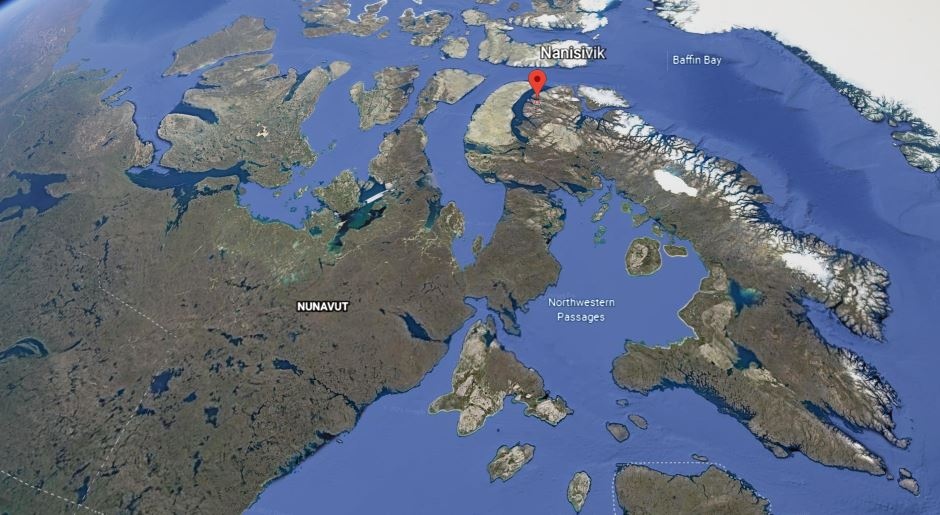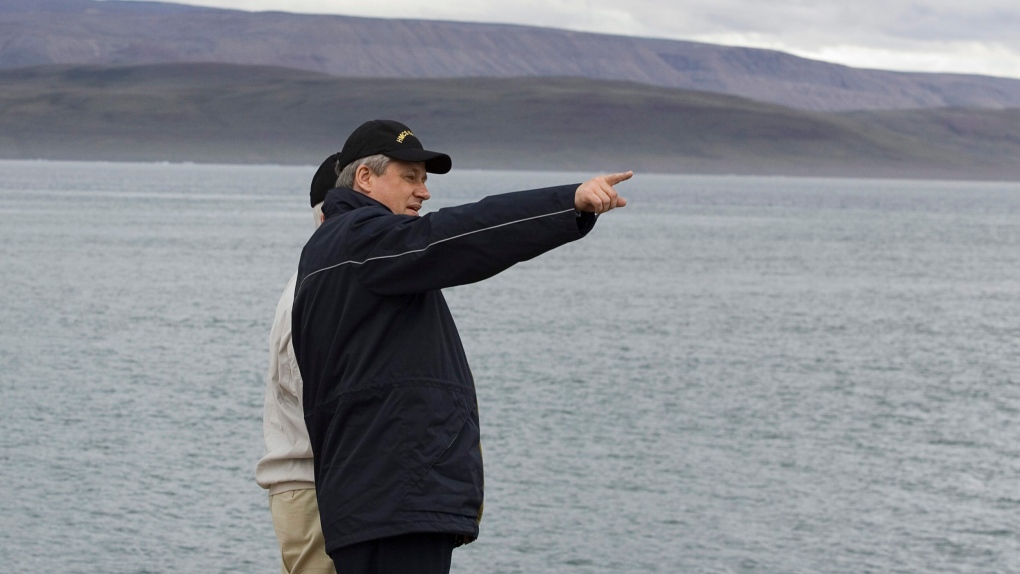Navy facility in Canadian Arctic 'could be finished this season,' a decade overdue
 Her Majesty’s Canadian Ship (HMCS) Montreal passes an iceberg near Nanisivik, Nunavut, during Operation NANOOK, a sovereignty operation in Canada's Arctic in August 2010. (Cpl. Rick Ayer, Formation Imaging Services/DND)
Her Majesty’s Canadian Ship (HMCS) Montreal passes an iceberg near Nanisivik, Nunavut, during Operation NANOOK, a sovereignty operation in Canada's Arctic in August 2010. (Cpl. Rick Ayer, Formation Imaging Services/DND)
Nearly a decade behind schedule, the Canadian military’s long-promised naval refuelling station in the High Arctic could open as early as this summer, albeit with restrictions on the facility's operations and serious questions about its long-term viability.
The Department of National Defence says contractors at the $115-million Nanisivik Naval Facility are still fixing valves, painting buildings and replacing pipes before the maritime outpost on the northwestern coast of Baffin Island can operate.
National Defence spokesperson Frederica Dupuis characterized that work as "minimal," saying in an emailed statement this week the facility "could be finished this season, pending confirmation from the contractor."
But the Arctic construction season is short and the facility’s potential operating window will close by the end of summer, leaving the navy's new Arctic patrol vessels without a domestic resupply station in the Far North for at least another year.
Adding to the uncertainty, the Department of National Defence has yet to find suitable contractors to bring in fuel and operate the site. The department says officials are still assessing the needs of the new Arctic patrol vessels before a request for proposals can be issued.
Unheated fuel limits operations
Any marine fuel that does eventually arrive at Nanisivik will have to be barged in at the start of the operating season in late August.
Once on site, the fuel must sit in the facility's storage tanks for at least 48 hours before samples are flown to Ottawa for testing – a procedure that will take approximately one week to complete, according to Dupuis.
Once the fuel is approved by Ottawa, the Nanisivik facility will have about four to five weeks to replenish the Arctic ships before the weather forces the facility to shut down for the season.
"Depending on the temperatures in late September, fuel may start to thicken as the fuel tanks and lines are not heated, limiting the navy’s ability to use the fuel," Dupuis said. "At that time, the fuel must be removed from the tanks."
An agreement between the military and the Nunavut government will also prevent the navy from breaking any sea ice near the facility in order to protect wildlife and preserve the local population's access to frozen water, according to both Dupuis and a 2022 auditor general's report on Arctic security.
"For the rest of the navigation season, the ships' refuelling will continue to depend on commercial options or allies' co-operation," the auditor general's report noted.
"This leaves the navy at risk of not getting replenishment for its ships where and when needed."
COVID-19, weather add to delays
Originally envisioned as a year-round, deep-water port and airstrip from which Canada would assert sovereignty over territorial Arctic waters, including the Northwest Passage, then prime minister Stephen Harper announced the new facility in 2007, coinciding with his government's commitment to build up to eight Arctic and offshore patrol vessels for the navy.
The facility was to be completed by 2015, but the project was scaled back when the expected budget for the facility surpassed $258 million.
Today, the site plan includes unheated fuel storage tanks, a site office, a wharf operator's shelter, a helicopter landing pad and an unheated storage building.
An existing jetty has undergone minor repairs to accommodate the Arctic patrol ships and any other government vessels in need of refuelling.
 A map showing the approximate location of the Nanisivik Naval Facility on Baffin Island. (Google Maps)
A map showing the approximate location of the Nanisivik Naval Facility on Baffin Island. (Google Maps)
Construction finally began at the site in 2015, but inclement weather and the COVID-19 pandemic brought further delays to what is already a short construction season in the region.
In 2021, with little to no construction happening due to pandemic travel restrictions, the road connecting the Nanisivik facility to the nearest operational airport in Arctic Bay, Nunavut, washed away.
"The contractor was unable to bring heavy vehicles across the bridge, and unable to access the worksite for the 2021 construction season," Dupuis said.
"The road was deemed safe for use in 2022, which allowed work to resume while still managing pandemic restrictions during this time."
Nanisivik is wrong location, expert says
Retired Col. Pierre Leblanc, who previously commanded the Canadian Forces in the North and now serves as a consultant on Arctic security, says the Nanisivik project was doomed from the beginning.
The Nanisivik facility is located approximately 100 kilometres south of the Northwest Passage, the contested sea lane between the Atlantic and Pacific oceans, which Canada has long claimed sovereignty over.
For years, Leblanc has advocated for scrapping the Nanisivik project in favour of establishing a naval and border-control port approximately 350 kilometres away in Resolute Bay, an established community with a larger airport that's situated directly on the important Arctic sea route.
It’s also already home to the Canadian Forces Arctic Training Centre, a permanent military base specializing in northern operations, and other federal agencies maintain a presence there, including the RCMP and Natural Resources Canada.
"So anybody that's going to be going across the Northwest Passage, which is still contested internationally as being Canadian internal waters, would have to sail by essentially a federal security and military facility," Leblanc said in an interview this week.
 Former prime minister Stephen Harper looks down the shoreline in the Arctic port of Nanisivik, Nunavut on August 10, 2007. (THE CANADIAN PRESS/Fred Chartrand)
Former prime minister Stephen Harper looks down the shoreline in the Arctic port of Nanisivik, Nunavut on August 10, 2007. (THE CANADIAN PRESS/Fred Chartrand)
As an Arctic commander, Leblanc says he routinely ran scenarios with the Canadian Forces involving foreign vessels transiting the passage, either carrying weapons for adversarial countries or plundering Canadian natural resources, to test the military's ability to assess and respond to a crisis in the northern sea.
"And the two questions at the time were, would we know it's happening? The answer was no. Would we be able to do anything about it? The answer was also no," he said.
Vessel traffic in the Arctic is only expected to grow over the coming years, a reality Canada's latest defence policy highlights as a national-security priority.
"By 2050, the Arctic Ocean could become the most efficient shipping route between Europe and East Asia," Defence Minister Bill Blair wrote in the introduction to the current policy, released in April.
"As the Arctic becomes more accessible to foreign actors, we need to ensure our military has the tools to assert our sovereignty and protect Canada's interests."
The Department of National Defence says it has spent approximately $107.6 million of the Nanisivik facility's anticipated $114.6-million budget to date.
CTVNews.ca Top Stories

Father and daughter found dead in northwest Calgary
Calgary police are investigating the death of a father and daughter on Sunday night as a double homicide and believe it's the result of a domestic incident.
Year in review: Notable people who died in 2024
Here is a roll call of some noteworthy figures who died in 2024.
Halifax airport runway reopens after plane caught fire upon landing
The plane that caught fire upon landing at Halifax's airport over the weekend has been removed, and the runway has reopened.
opinion Tom Mulcair: Grading Trudeau's performance in 2024, and what's ahead for him in the new year
Prime Minister Justin Trudeau is about to enter the final year of his mandate and, quite possibly, of his political career, writes Tom Mulcair in his column for CTVNews.ca. The former NDP leader takes a snapshot of Trudeau's leadership balance sheet as a way of understanding how he got to where he is in the polls.
Murder, she spoke: Violence and death getting mentioned more often in movie scripts, study finds
A new study shows that movies have more violence in them than ever -- or at least, movie characters are more interested in talking about it.
Appeals court upholds US$5 million award in sexual abuse verdict against Donald Trump
A federal appeals court on Monday upheld a jury’s finding in a civil case that Donald Trump sexually abused a columnist in an upscale department store dressing room in the mid-1990s.
Gal Gadot reveals she underwent emergency surgery for brain clot just after welcoming her 4th child
Gal Gadot is opening up about how she survived a "massive blood clot" in her brain during her most recent pregnancy.
S&P/TSX composite down more than 200 points, U.S. markets fall
Canada's main stock index was down more than 200 points in late-morning trading Monday, led by weakness in technology and base metals, while U.S. markets also fell, led by a 1.4 per cent loss on the Nasdaq.
Passengers describe travel nightmare after WestJet flight from Costa Rica cancelled
It was a travel nightmare that left more than 100 passengers, including Ottawa residents, stranded in Costa Rica this week.

































